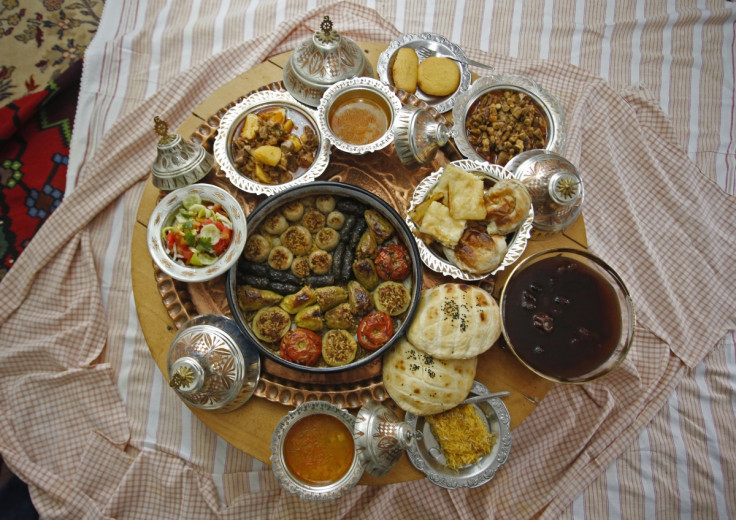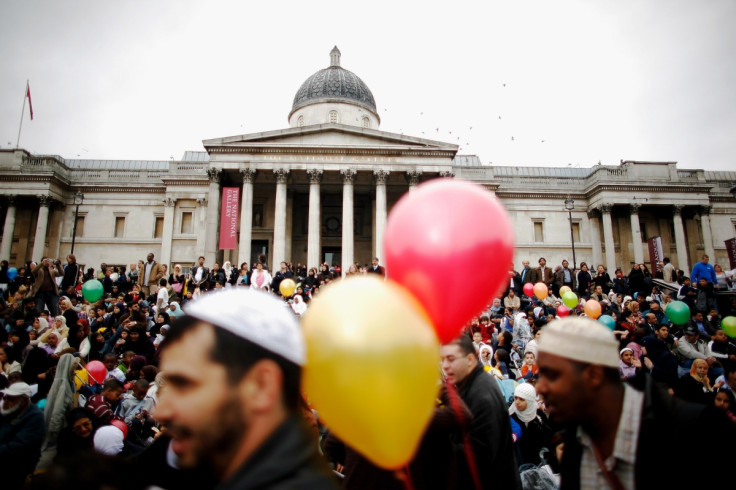Eid 2014: How to Ensure Your Day of Feasting Doesn't End in A&E

Muslims across the world will complete the observance of the month of Ramadan on 28-29 July 2014, ending a 30-day period of fasting that can last for up to 19-20 hours a day in some countries. This year, both the print and online media realms have been flooded with advice on how and what to eat during Ramadan, to prevent the health problems which can result from such an extreme dietary regime.
However, the problem we really need to address here is: what happens after Ramadan, especially on the day of Eid al Fitr? Are people still going to exercise individual abstinence, eating in moderation and apply healthy eating guidelines to their daily lifestyle, or are they simply going to let go and eat plentiful?
On the day of Eid, people get together to enjoy what is possibly the most lavish and important meal of the year. There's a traditional breakfast and then a lavish lunch and an equally lavish dinner. The whole day revolves around feasting, and the Eid dining table will feature everything from fried food, breads and meat platters to lavish sweets and puddings. Restaurants across the world offer special Eid packages, coaxing those who fasted for the whole month to come and experience their delights.
Yet the Eid festivities, and the transition from fast to feast, present the real and serious dangers of binge eating. Flooding your body with food can cause myriad medical problems, from the psychological damage caused by rapid wait gain to the physical trauma or a torn stomach wall. Many Muslim communities have been ravaged by the consequences of binge-eating in the past; in 2011, for example, 1300 Qataris were hospitlaised for overeating during Eid al Adha, an event which is distinct from the post-Ramadan Eid-al-Fitr, but which involves the same burst of food in a short period of time.
When you are fasting for 30 days, the metabolic processes are switched to conserve energy. Long gaps between meals switch the body into storage mode and the balance between fat and lean body tissue is greatly disturbed. So when people finally eat, and over-eat, it can be a frightening and bewildering experience.
This article will, hopefully, guide you in the perils and vagaries of binge-eating, and allow Muslims everywhere to approach this year's Eid celebrations with confidence.
How do people typically eat during Eid
After Ramadan people will vary greatly in what they eat and the amount they consume. Some will binge - i.e. eat a lot of food rapidly and lose control over their eating. Yet some people will simply graze or overeat, nibbling all day without being able to stop. For some people, their mind becomes so preoccupied with food that they simply can't help themselves but to overeat. There is, quite simply, no normal.
What can happen to your body if you binge/over-eat on Eid?
Overeating soon after such a prolong period of fasting is dangerous. Feasting, indulging will have consequences for your health and will lead to problems in the gastrointestinal tract and a rapid weight gain for some people. Some people who rush through their meal will experience wind, stomach distension and abdominal pains.
Peter Cooper writes in his book Overcoming Bulimia Nervosa and Binge-Eating: "Binge usually produces a sense of fullness and bloatedness, sometimes this is so extreme as to cause profound abdominal discomfort, and, occasionally acute pain in the abdomen.
"The fullness frequently leads to breathlessness caused by the distended stomach pressing up against the diaphragm and thereby interfering with breathing. In rare cases, the stomach wall can be damaged and even tear."

What about the psychological implications?
People who've binged/overeaten will experience a wide range of depressive symptoms, such as feelings of guilt, worthlessness, lack of energy, depression, an upset stomach, irritability and poor concentration.
All this stems from feelings of failure surrounding their lack of control over their eating. It's well documented that binge eating leads to anger. In the aftermath of binge, many who suffer from disordered eating take laxatives as a mean of self punishment, some embark on so-called other aesthetic diets and some will use extreme measures to over compensate for binge eating.
What sort of things can I do to avoid these problems?
Be very careful on how you eat and how much you eat. Don't forget that after 30 days of fasting, your gut function has decreased and your body has adapted to a new eating regime. It's difficult for your body to digest large amounts of food.
Challenge your patterns of eating. Is your eating chaotic? Bingeing is often a result of starvation and dieting. These cravings for foods indicate that your body is not getting enough nutrients. See a consultant/practitioner after Eid.
Don't skip breakfast, as this will just lead to over-eating during the day. And keep yourself hydrated throughout the day.
In order to avoid excessive consumption of greasy, fatty fried foods, always start your meal with a light salad. Always add a serving of salad or fruit with whatever you eat- here you are just preventing your system from collapsing, which can happen due to compulsive consumption of heavy foods.
Be careful with salt if you suffer from a heart condition, and manage your portions. Ideally your plate should be divided into ½ vegetables and salad, ¼ protein and ¼ carbohydrates.
Do not attempt to try all the dishes, no matter how tempting they may seem, and make sure you chew every mouthful, as this is optimal for good digestion. When you actually have to stop and chew your food until it's soft, your brain will have a chance to catch up and send out the signal when it's feeling full, or if it's still hungry.
If you finish your meal in 5 minutes, you'll probably go back for seconds only to end up feeling very full half an hour later. According to Dr David Forecast, consultant gastroenterologist at the London Clinic it takes 20 minutes over your meal, if you chew it properly.
How do I tell if I'm full?
Dr David Forecast suggests you should stand up at some point during your meal. "if you feel comfortable but not over-full when you stand, then you've eaten enough" he says.
Remember: Eid is not a day of overeating, but a day of meeting and greeting and spending time with your loved ones. So Eat Smart and spend the Day with your loved ones under the summer sun and not in the local A&E unit.
Maha Khan runs her own blog on Islam and eating disorders, which strives to help Muslims avoid the problems which can be created by Eid and other festivals. To visit the blog, click here.
© Copyright IBTimes 2025. All rights reserved.



















